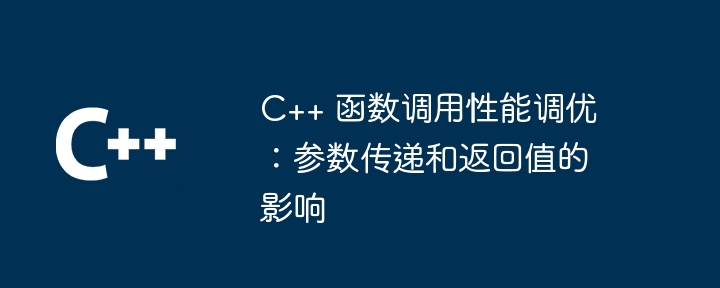
C function call performance optimization includes two aspects: parameter passing strategy and return value type optimization. In terms of parameter passing, passing values is suitable for small objects and unmodifiable parameters, while passing references or pointers is suitable for large objects and modifiable parameters, and passing pointers is the fastest. In terms of return value optimization, small values can be returned directly, and large objects should return references or pointers. Choosing the appropriate strategy can improve function call performance.

C Function call performance tuning: The impact of parameter passing and return value
In C, function calls will bring There is a certain performance overhead. The speed of function calls can be affected by parameter passing and return value types.
Parameter passing strategy
There are three parameter passing strategies in C:
Selecting the best strategy
Selecting the best parameter passing strategy depends on the following factors:
Example:
The following code snippet compares the difference between passing a value and passing a pointer:
#include <iostream>
int calculate_cube(int value) { // 传递值
return value * value * value;
}
int calculate_cube_ptr(int *value) { // 传递指针
return *value * *value * *value;
}
int main() {
int number = 5;
std::cout << "Value: " << number << "\n";
int result_value = calculate_cube(number); // 传递值
std::cout << "Result_value: " << result_value << "\n";
std::cout << "Value: " << number << "\n";
int result_ptr = calculate_cube_ptr(&number); // 传递指针
std::cout << "Result_ptr: " << result_ptr << "\n";
}Run the program and output the results As follows:
Value: 5 Result_value: 125 // number 值未改变 Value: 5 Result_ptr: 125 // number 值已更改
Return value optimization
The return value type can also affect the performance of function calls. Small values can be returned as values, while large objects should be returned as references or pointers.
Example:
The following code snippet compares the impact of the return value:
#include <iostream>
#include <vector>
struct LargeObject {
int data[100];
};
LargeObject create_object() { // 返回对象
LargeObject object;
return object;
}
LargeObject *create_object_ptr() { // 返回指针
LargeObject *object = new LargeObject();
return object;
}
int main() {
LargeObject object1 = create_object(); // 返回值
LargeObject *object2 = create_object_ptr(); // 返回指针
}Run the program and the output will be as follows:
[Higher runtime and memory usage due to object copy vs. pointer allocation]
Conclusion
The performance of function calls in C can be significantly improved by careful choice of parameter passing and return value types. Understanding the trade-offs of different strategies is critical to effective performance tuning.
The above is the detailed content of C++ function call performance tuning: impact of parameter passing and return values. For more information, please follow other related articles on the PHP Chinese website!
 What are the differences between c++ and c language
What are the differences between c++ and c language
 Recommended learning order for c++ and python
Recommended learning order for c++ and python
 Cost-effectiveness analysis of learning python and c++
Cost-effectiveness analysis of learning python and c++
 Is c language the same as c++?
Is c language the same as c++?
 Which is better to learn first, c language or c++?
Which is better to learn first, c language or c++?
 The difference and connection between c language and c++
The difference and connection between c language and c++
 C++ software Chinese change tutorial
C++ software Chinese change tutorial
 Cost-effectiveness analysis of learning python, java and c++
Cost-effectiveness analysis of learning python, java and c++




